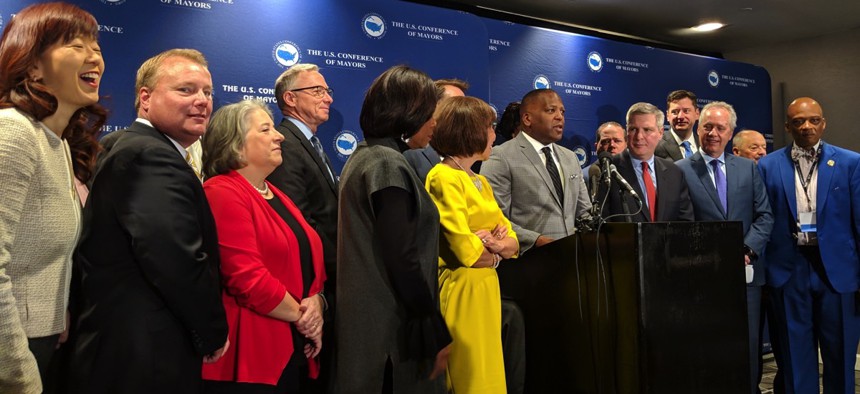Mayors Seek ‘Federal Partners’ Amid Shutdown

Columbia, South Carolina Mayor Steve Banjamin speaks to press at the U.S. Conference of Mayors winter meeting Wednesday in Washington, D.C. Dave Nyczepir / Route Fifty
Mayors called on leaders in Washington to reopen the government, while highlighting their efforts to help federal employees and others hurt by the shutdown.
WASHINGTON — Mayors in D.C. Wednesday for their annual winter meeting contrasted their consensus building with the ongoing federal shutdown, the fallout from which has left local government officials scrambling to fill in gaps for struggling people where they can.
The U.S. Conference of Mayors’ Infrastructure Task Force has developed a five-point plan calling for, among other things, federal investment in state and local block grants, repairing crumbling water systems and climate mitigation funding. But a bipartisan group of mayors said they know trying to move forward on those ideas is unlikely to happen while gridlock rules in Washington.
“No one wins when there’s a federal government shutdown,” said Columbia, South Carolina Mayor Steve Benjamin, who currently serves as USCM president. “We stand ready to work with all our federal partners.”
D.C. Mayor Muriel Bowser has already pledged $2 million to keep the food stamp program, which helps poor families buy groceries, afloat should federal funding dry up. Legislation is on her desk to halt eviction and foreclosure proceedings for 90 days if residents can prove they’ve been furloughed.
The mayor has also introduced separate emergency legislation that would allow federal employees who live in the District to file for unemployment while they work without pay.
“We are struggling to make sure that the quality of lives of our residents aren’t disrupted,” Bowser said.
The Trump administration’s Labor Department has issued guidance that says these employees aren’t eligible for unemployment, but some states, like California, have said they will move forward anyway.
Later in the day, House Speaker Nancy Pelosi addressed the mayors organization, speaking at times about the shutdown. “I know, as the daughter and sister of a mayor, that there is no buffer between a mayor and his or her constituents. You hear the stories," she said. "You know the pain. You feel it. You know that the shutdown must end, and it must end now.”
But exactly what the path forward will be on the 33rd day of the shutdown wasn't exactly clear. The Senate is scheduled to vote on two funding bills on Thursday, including one offered by President Trump that contains $5.7 billion for a border wall with Mexico. That funding is at the heart of his decision to partially shutdown the government.
Pelosi has rejected the president's plan, although the Washington Post reported Thursday that House Democrats were working on a proposal to offer Trump more money for border security that doesn't include a wall. Meanwhile, Pelosi told Trump that she would not allow him to deliver the annual State of the Union address next week as long as the government is closed.
Local government leadership across the country has been responding to the shutdown in a number of ways, from telling federal workers they can defer making utility payments to Denver's plan to offer mortgage assistance to those that need it.
The possibility of airport workers deciding not to show up to work has mayors concerned enough to consider loan programs to keep air traffic controllers and security screeners at their posts. For example, San Jose, California has moved forward with a plan to pay those workers during the shutdown.
Atlanta Mayor Keisha Lance Bottoms thanked her colleagues for giving her city council the idea as it prepares to host this year’s Super Bowl on Feb. 3. On Wednesday, Bottoms told Georgia Public Broadcasting that the city is working on a solution with its credit union and is “very close to finalizing a plan to provide some financial support" for TSA workers.
“On the East Coast, in order to get to heaven when you die, you must get through Atlanta’s airport,” Benjamin joked.
The longer the historic shutdown goes, the more mayors will start to worry about federal public transit funding for years 2020 and 2021, said Madison, Wisconsin Mayor Paul Soglin.
New Orleans Mayor LaToya Cantrell said one of her priorities in coming to Washington this week is to ensure federal infrastructure dollars are allocated on the ground in her city.
“We need the federal government to be a partner in all of that, and we need a transportation infrastructure bill to be passed,” said Burnsville, Minnesota Mayor Elizabeth Kautz.
USCM CEO and Executive Director Tom Cochran touted the fact eight presidential contenders will attend the winter meeting this year.
“We’re not escaping the responsibility of tomorrow by evading it today,” said Rochester Hills, Michigan Mayor Bryan Barnett, vice president of USCM, echoing a quote from President Abraham Lincoln. “And we invite Washington to follow our lead.”
Dave Nyczepir is a News Editor at Route Fifty and is based in Washington, D.C.
NEXT STORY: What Democratic and Republican Mayors Agree On






